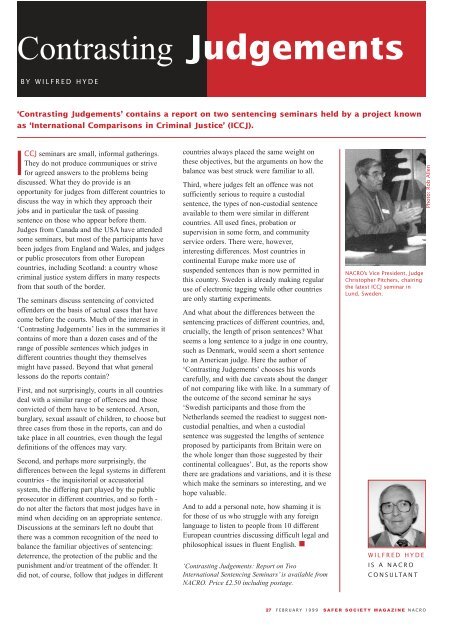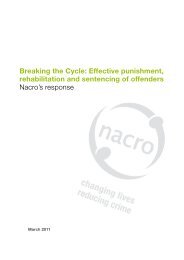Safer Society FEATURE Legisl<strong>at</strong>ion, Race and Criminal JusticeOther search powers(PACE s.60, to preventincidents of violence, andthe Prevention of TerrorismAct 1989) are also beingused disproportion<strong>at</strong>elyagainst people fromminority communities; forexample, of the 7,970 s.60searches, 47% were ofwhite people, 11% were ofblack people and 39%were of Asians. This needsfurther explan<strong>at</strong>ion.Despite very welcome developments in using ethnicmonitoring systems across the criminal justice system, thereremains a key section which is still not subject to monitoring– sentencing in magistr<strong>at</strong>es’ courts and Crown Courts. Thismakes it impossible to track cases as they go through thesystem or to identify trends and p<strong>at</strong>terns in sentencing.Introducing ethnic monitoring of sentencing decisions shouldbe a priority for the Lord Chancellor’s Department.The CPS is committed to introducing monitoring ofprosecution decisions. However, it is to be based on d<strong>at</strong>ag<strong>at</strong>hered by the police. At present, police decide themselveson a suspect’s ethnic origin, often using a code system – IC1,IC2 etc. This system might well be needed when trying totrack down suspects who are <strong>at</strong> large, but once someone isdetained and charged, they should be asked to specify theirown ethnic origin – a self-classific<strong>at</strong>ion system r<strong>at</strong>her than apolice classific<strong>at</strong>ion system.Similarly, victims of crime should also be asked to providetheir ethnic origin so th<strong>at</strong>, for example, clear up r<strong>at</strong>es fordifferent groups can be identified.The value of legisl<strong>at</strong>ionFrom its origins as a rel<strong>at</strong>ively modest piece of legisl<strong>at</strong>ion -requiring the Secretary of St<strong>at</strong>e to publish inform<strong>at</strong>ion to helpthose engaged in the administr<strong>at</strong>ion of justice to avoiddiscrimin<strong>at</strong>ing on grounds of race, sex or any other improperground – s.95 is becoming an invaluable tool.The Crime and Disorder Act 1998 includes new and strongerlegisl<strong>at</strong>ion covering racially-motiv<strong>at</strong>ed offences, which isanother welcome development – provided of course the newpowers are used, monitored and kept under review to ensurethey are really doing the job.‘Fairness and justice are inseparable and amajor task for the criminal justice system isto ensure full equality for all.’ (Lord JusticeRose, Chairman, Criminal JusticeConsult<strong>at</strong>ive Council, introduction to the1998 Section 95 report).became UK law under theHuman Rights Act 1998. Article14 provides th<strong>at</strong> ‘the enjoymentof the rights and freedoms setforth in this Convention shall besecured without discrimin<strong>at</strong>ionon any ground such as sex, race,colour, language, religion,political or other opinion,n<strong>at</strong>ional or social origin,associ<strong>at</strong>ion with a n<strong>at</strong>ionalminority, property, birth or otherst<strong>at</strong>us.’The Act makes it unlawful for public authorities – includingcentral and local government, courts, police, and immigr<strong>at</strong>ionofficers – to act in ways which are incomp<strong>at</strong>ible with theConvention. As well as Article 14, Article 5 on the right toliberty may have implic<strong>at</strong>ions for stop and search and arrest;Article 6 may have implic<strong>at</strong>ions in terms of ensuring a fair trial;and other articles may become important as case law isdeveloped.This is a key piece of legisl<strong>at</strong>ion which will have far-reachingimplic<strong>at</strong>ions. Complaints about unfairness or discrimin<strong>at</strong>ion canbe set in a human rights context and tested in court. Individualsshould more easily be able to bring their grievances to court.It is essential th<strong>at</strong> this new legisl<strong>at</strong>ion is used to the best effect.One way to do this would be to establish a Human RightsCommission – as proposed by organis<strong>at</strong>ions such as the Institutefor Public Policy Research - which could act as an umbrellaorganis<strong>at</strong>ion to promote and safeguard the human rights ofdifferent groups in the community. Such a body would coordin<strong>at</strong>ethe use of new legisl<strong>at</strong>ion and monitor its effectiveness.It could help individuals to bring cases to test the applic<strong>at</strong>ion ofthe Human Rights Act, and it could have an educ<strong>at</strong>ional role inpromoting the importance of human rights.So far the Government has decided not to establish aCommission. NACRO hopes th<strong>at</strong> it may keep this under review.The inquiry report into the de<strong>at</strong>h of Stephen Lawrence willshortly be published. It will have implic<strong>at</strong>ions for all policeareas, not only the Met, and for other agencies in the criminaljustice process.* Establishing a Human Rights Commission tohelp to implement the report’s recommend<strong>at</strong>ions would be asignificant step which would help to underline the Government’scommitment to fairness and equality. * The next issue of ‘Safer Society’ will include an article about theinquiry report and responses to it.Could even more be done to cre<strong>at</strong>e a strong and workablelegisl<strong>at</strong>ive framework to ensure equality in the administr<strong>at</strong>ion ofjustice? In its call for reform of the 1976 Race Rel<strong>at</strong>ions Act, theCommission for Racial Equality (CRE, 1998) is pressing for theAct to include discrimin<strong>at</strong>ion by any public body including thepolice and the Prison Service, which until now have beenexempt. NACRO strongly supports this proposal.Such an amendment will in any case become necessary in the lightof Article 14 of the European Convention on Human Rights, whichReferencesCRE (1998), ‘Reform of the Race Rel<strong>at</strong>ions Act 1976: Proposal for ChangeSubmitted by the CRE to the Secretary of St<strong>at</strong>e’Home Office (1998), ‘St<strong>at</strong>istics on Race and the Criminal Justice System: HomeOffice Public<strong>at</strong>ion Under Section 95 of the Criminal Justice Act 1991’Phillips, C and Brown, D (1998), ‘Entry into the Criminal Justice System: A Surveyof Police Arrests and Their Outcomes’, Home Office Research Study No.185NACRO SAFER SOCIETY MAGAZINE FEBRUARY 1999 26
Contrasting JudgementsBY WILFRED HYDE‘Contrasting Judgements’ contains a report on two sentencing seminars held by a project knownas ‘Intern<strong>at</strong>ional Comparisons in Criminal Justice’ (ICCJ).ICCJ seminars are small, informal g<strong>at</strong>herings.They do not produce communiques or strivefor agreed answers to the problems beingdiscussed. Wh<strong>at</strong> they do provide is anopportunity for judges from different countries todiscuss the way in which they approach theirjobs and in particular the task of passingsentence on those who appear before them.Judges from Canada and the USA have <strong>at</strong>tendedsome seminars, but most of the participants havebeen judges from England and Wales, and judgesor public prosecutors from other Europeancountries, including Scotland: a country whosecriminal justice system differs in many respectsfrom th<strong>at</strong> south of the border.The seminars discuss sentencing of convictedoffenders on the basis of actual cases th<strong>at</strong> havecome before the courts. Much of the interest in‘Contrasting Judgements’ lies in the summaries itcontains of more than a dozen cases and of therange of possible sentences which judges indifferent countries thought they themselvesmight have passed. Beyond th<strong>at</strong> wh<strong>at</strong> generallessons do the reports contain?First, and not surprisingly, courts in all countriesdeal with a similar range of offences and thoseconvicted of them have to be sentenced. Arson,burglary, sexual assault of children, to choose butthree cases from those in the reports, can and dotake place in all countries, even though the legaldefinitions of the offences may vary.Second, and perhaps more surprisingly, thedifferences between the legal systems in differentcountries - the inquisitorial or accus<strong>at</strong>orialsystem, the differing part played by the publicprosecutor in different countries, and so forth -do not alter the factors th<strong>at</strong> most judges have inmind when deciding on an appropri<strong>at</strong>e sentence.Discussions <strong>at</strong> the seminars left no doubt th<strong>at</strong>there was a common recognition of the need tobalance the familiar objectives of sentencing:deterrence, the protection of the public and thepunishment and/or tre<strong>at</strong>ment of the offender. Itdid not, of course, follow th<strong>at</strong> judges in differentcountries always placed the same weight onthese objectives, but the arguments on how thebalance was best struck were familiar to all.Third, where judges felt an offence was notsufficiently serious to require a custodialsentence, the types of non-custodial sentenceavailable to them were similar in differentcountries. All used fines, prob<strong>at</strong>ion orsupervision in some form, and communityservice orders. There were, however,interesting differences. Most countries incontinental Europe make more use ofsuspended sentences than is now permitted inthis country. Sweden is already making regularuse of electronic tagging while other countriesare only starting experiments.And wh<strong>at</strong> about the differences between thesentencing practices of different countries, and,crucially, the length of prison sentences? Wh<strong>at</strong>seems a long sentence to a judge in one country,such as Denmark, would seem a short sentenceto an American judge. Here the author of‘Contrasting Judgements’ chooses his wordscarefully, and with due cave<strong>at</strong>s about the dangerof not comparing like with like. In a summary ofthe outcome of the second seminar he says‘Swedish participants and those from theNetherlands seemed the readiest to suggest noncustodialpenalties, and when a custodialsentence was suggested the lengths of sentenceproposed by participants from Britain were onthe whole longer than those suggested by theircontinental colleagues’. But, as the reports showthere are grad<strong>at</strong>ions and vari<strong>at</strong>ions, and it is thesewhich make the seminars so interesting, and wehope valuable.And to add a personal note, how shaming it isfor those of us who struggle with any foreignlanguage to listen to people from 10 differentEuropean countries discussing difficult legal andphilosophical issues in fluent English. ‘Contrasting Judgements: Report on TwoIntern<strong>at</strong>ional Sentencing Seminars’ is available fromNACRO. Price £2.50 including postage.NACRO’s Vice President, JudgeChristopher Pitchers, chairingthe l<strong>at</strong>est ICCJ seminar inLund, Sweden.WILFRED HYDEIS A NACROCONSULTANTPhoto: Rob Allen27 FEBRUARY 1999 SAFER SOCIETY MAGAZINE NACRO
















